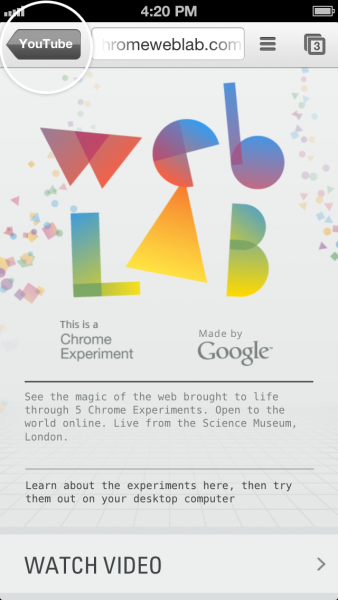Google gives iOS developers a choice, and it ain't mobile Safari
 Just yesterday, I suggested that Gmail for iOS, which new version links to Google apps rather than Safari, might be a bigger deal. Sure enough, is it ever. The search and information giant is hellbent on co-opting Apple's mobile platform by offering superior apps tightly tied to web services. But the strategy depends on Chrome.
Just yesterday, I suggested that Gmail for iOS, which new version links to Google apps rather than Safari, might be a bigger deal. Sure enough, is it ever. The search and information giant is hellbent on co-opting Apple's mobile platform by offering superior apps tightly tied to web services. But the strategy depends on Chrome.
Contrary to popular tech convention, Android isn't the future of Google platforms, neither is Chrome OS, nor is an amalgamation of the two. The browser is the go-forward platform of choice. Android and Chrome stand apart, competing with operating systems like iOS and Windows. Chrome can co-opt them and others. The browser is more natural fit for Google services and anchors them anywhere. This is the lesson from March's corporate shake-up that put Android under Sundar Pichai, who leads Chrome and Apps.
But Chrome on iOS was an illegal alien granted temporary visa. Now the browser is a resident alien seeking citizenship and cooperation of other Apple platform immigrants. Gmail's new-found capability -- linking to apps like Maps and YouTube -- foreshadows the future. Google plans to help every Tom, Dick and Jane developer bring anarchy to iOS, by providing means to link to Chrome instead. The strategy is brilliant and unfathomable. How could Apple let the maker of Android get away with something so bold?
Perhaps this is a symptom of the post-Steve Jobs era. Remember, Jobs blocked Adobe Flash, spinning falsehood -- that the tech sucks -- to distract from truth: He didn't want a competing development environment on iOS. Apple's cofounder wanted to control the app platform -- his way and not any other. The tactic made Flash a dirty word across the Internet and ensured the App Store's success, under Jobs' watchful eye.
The platform flourished, consumers got consistent user experiences, apps maintained a reasonably high quality and riffraff found placing malware more challenging compared to many other operating systems.
Chrome is far more dangerous to iOS than Flash, because Google packs development punch and the wherewithal to drive apps -- its own and others -- across multiple operating systems. Packaged Apps are coming, for example, and they will make the browser a pseudo operating system usurping others. Put iOS head of the class.
Michele Aiello, Google software engineer, explains: "As an iOS app developer, when your users want to access web content, you currently have two options: create your own in-app web browser frame, or send users away from your app to a browser". Go ahead and say it. Safari. "With Chrome’s OpenInChromeController class with x-callback, users can open a web page in Chrome and then return to your app with just one tap".
The project isn't new, but suddenly quite believable, looking at what Google demonstrates with Gmail and Aiello's explanation yesterday. And Apple just lets Google strut around iOS like it owns the place. Developers tapping their apps in the Chrome won't flaunt Safari.
Wait! What's that sound? Do you feel the earth tremble? Steve Jobs just rolled over in his grave. I wonder what apparition will visit Apple CEO Tim Cook in dreams tonight.
